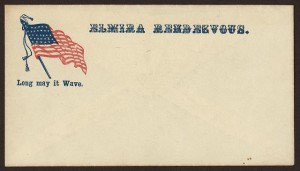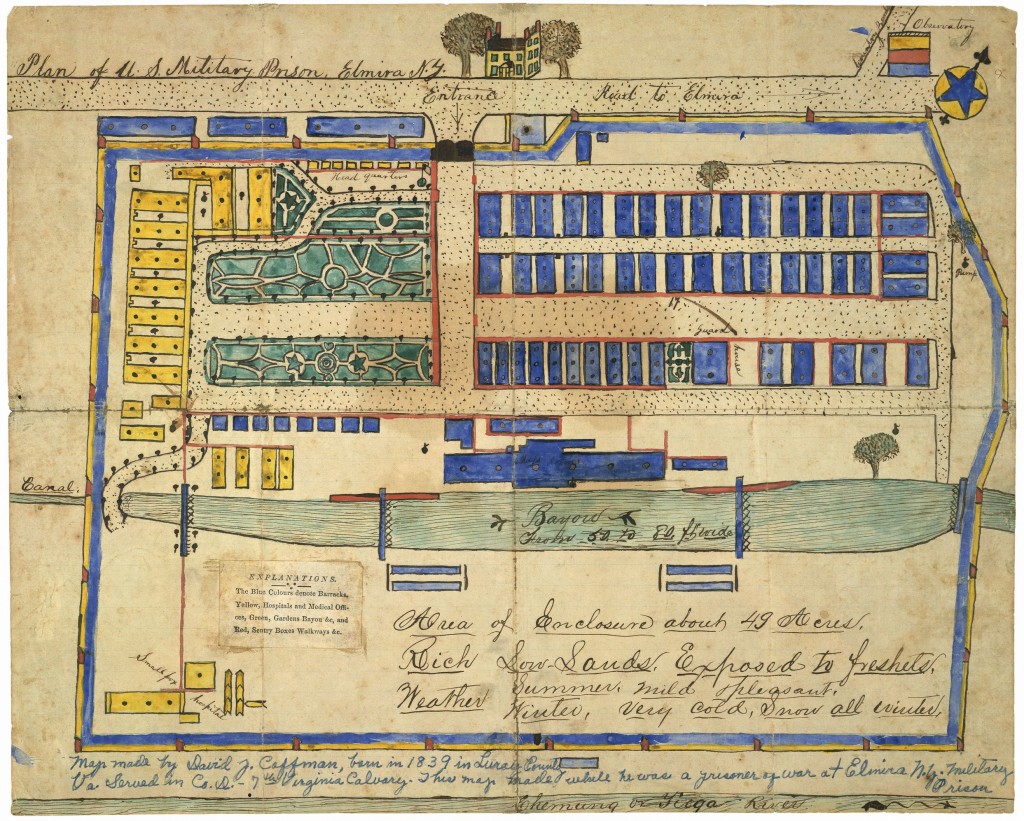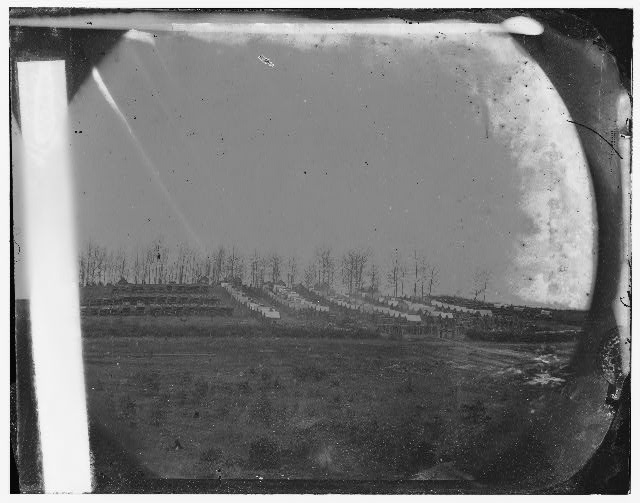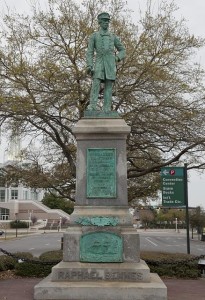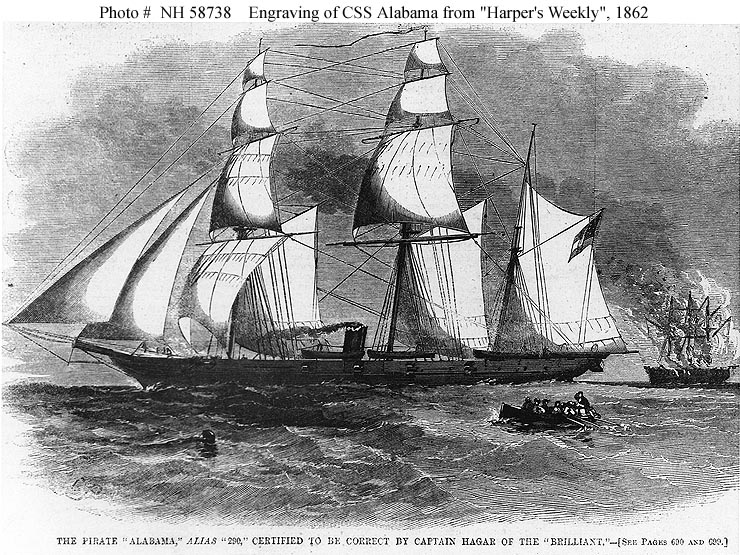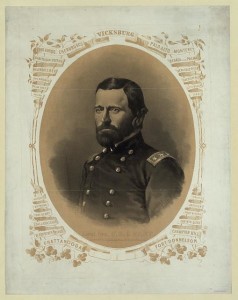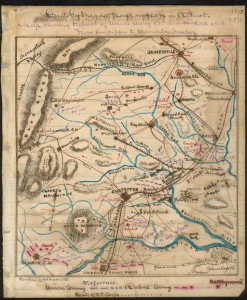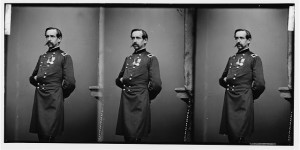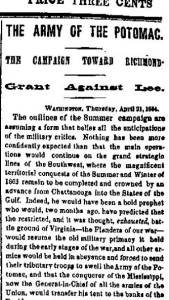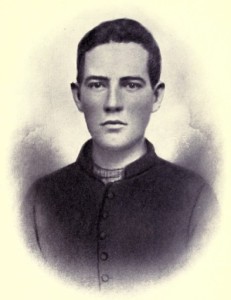
march like a terrapin – Private Dame
I’ve heard it said that, in general, we should trust sources closest to the date of a historical event. People can lie any time, but our memory sure can play tricks as time moves on and on. Here a member of the First Company of the Richmond Howitzers remembers, with the help of his journals, May 2, 1864 – about 55 years after the fact. Any luxuries accumulated over the winter had to be sent to Richmond via Orange Court House – the Federals were starting to move.
From From the Rapidan to Richmond and the Spottsylvania Campaign by William Meade Dame, D.D. (pages 63-65).
Nineteen miles from Orange Court House, Virginia, the road running northeast into Culpeper crosses “Morton’s Ford”” of the Rapidan River, which, just now, lay between the Federal “Army of the Potomac” and the Confederate “Army of Northern Virginia.”
As this road approaches within three-fourths of a mile of the river it rises over a sharp hill, and, thence, winds its way down the hill to the Ford. On the ridge, just where the road crosses it, the guns of the “First Richmond Howitzers” were in position, commanding the Ford; and the Howitzer Camp was to the right of the road, in the pine wood just back of the ridge. Here, we had been on picket all the winter, helping the infantry pickets to watch the enemy and guard the Ford.
One bright sunny morning, the 2d of May, 1864, a courier rode into the Howitzer Camp. We had been expecting him, and knew at once that “something was up.” The soldier instinct and long experience told us that it was about time for something to turn up. The long winter had worn away; the sun and winds, of March and April, had made the roads firm again. Just across the river lay the great army, which was only waiting for this, to make another desperate push for Richmond, and we were there for the particular purpose of making that push vain.
For some days we had seen great volumes of smoke rising, in various directions, across the river, and heard bands playing, and frequent volleys of firearms, over in the Federal Camp. Everybody knew what all this meant, so we had been looking for that courier.
Soon after we reached the Captain’s tent, orders were given to pack up whatever we could not carry on the campaign, and in two hours, a wagon would leave, to take all this stuff to Orange Court House; thence it would be taken to Richmond and kept for us, until next winter.
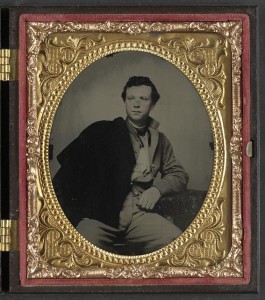
“Unidentified soldier in Richmond Howitzers uniform”
This was quickly done! The packing was not done in “Saratoga trunks,” nor were the things piles of furs and winter luxuries. The “things” consisted of whatever, above absolute necessaries, had been accumulated in winter quarters; a fiddle, a chessboard, a set of quoits, an extra blanket, or shirt, or pair of shoes, that any favored child of Fortune had been able to get hold of during the winter. Everything like this must go. It did not take long to roll all the “extras” into bundles, strap them up and pitch them into the wagon. And in less than two hours after the order was given the wagon was gone, and the men left in campaign “trim.”
This meant that each man had, left, one blanket, one small haversack, one change of underclothes, a canteen, cup and plate, of tin, a knife and fork, and the clothes in which he stood. When ready to march, the blanket, rolled lengthwise, the ends brought together and strapped, hung from left shoulder across under right arm, the haversack,—furnished with towel, soap, comb, knife and fork in various pockets, a change of underclothes in one main division, and whatever rations we happened to have, in the other,—hung on the left hip; the canteen, cup and plate, tied together, hung on the right; toothbrush, “at will,” stuck in two button holes of jacket, or in haversack; tobacco bag hung to a breast button, pipe in pocket. In this rig,—into which a fellow could get in just two minutes from a state of rest,—the Confederate Soldier considered himself all right, and ready for anything; in this he marched, and in this he fought. Like the terrapin—“all he had he carried on his back”—this all weighed about seven or eight pounds.
The extra baggage gone, all of us knew that the end of our stay here was very near, and we were all ready to pick up and go; we were on the eve of battle and everybody was on the “qui vive” for decisive orders. They quickly came!
Spring might have meant the heavy bloodletting would soon recommence, but it was also a chance for rebel soldiers to vary their diet with some gathered vegetables, any vegetables (page 59):
The winter had now worn away and the spring had come. Vegetation began to show signs of life. Its coming bore us one comfort in one way—among others. It was not so cold, and we did not have to tote so many logs of wood to keep up our fires. Down on the river flats, where vegetation showed sooner than it did on the hills, green things began to shoot up. Dandelions, sheep sorrel, poke leaves and such, though not used in civil life, were welcome to us, for they were much better than no salad at all. The men craved something green. The unbroken diet of just bread and meat—generally salt meat at that—gave some of the men scurvy. The only remedy for that was something acid, or vegetable food. The men needed this and craved it—so when the green shoots of any kind appeared we would go down on the flats, and gather up all the green stuff we could find, and boil it with the little piece of bacon we might have. It improved the health of the men very much.
The army of Northern Virginia survived the winter of 1863-64 on scant rations, but according to Mr. Dame the rations were about to get scanter (pages 72-73):
I have alluded to rations; they were scarce here, as always when any fighting was on hand. Even in camp, where all was at its best, we had for rations, per day, one and a half pints of flour, or coarse cornmeal,—ground with the cob in it we used to think,—and one-quarter of a pound of bacon, or “mess pork,” or a pound, far more often half a pound, of beef.
But, in time of a fight! Ah then, thin was the fare! That small ration dwindled until, at times, eating was likely to become a “lost art.” I have seen a man, Bill Lewis, sit down and eat three days’ rations at one time. He said “He did not want the trouble of carrying it, and he did want one meal occasionally that wasn’t an empty form.” The idea seemed to be that a Confederate soldier would fight exactly in proportion as he didn’t eat. And his business was to fight. This theory was put into practice on a very close and accurate calculation; with the odds that, as a rule, we had against us, in the battles of the Army of Northern Virginia, we had to meet two or three to one. Then, each Confederate soldier was called upon to be equal to two or three Federal soldiers, and, therefore, each Confederate must have but one-half or one-third the rations of a Federal soldier. It was easy figuring, and so it was arranged in practice.



